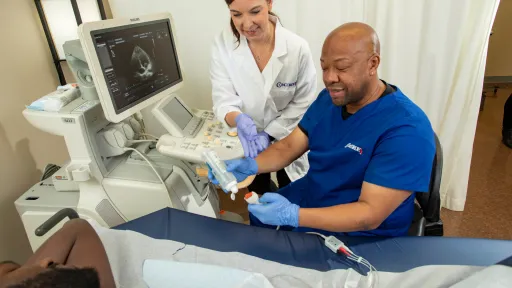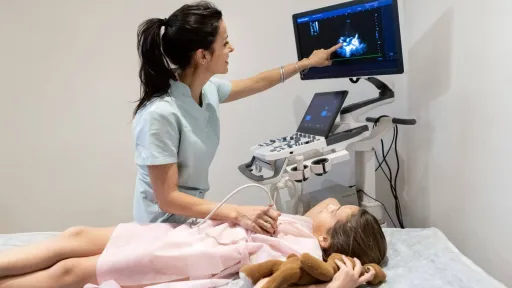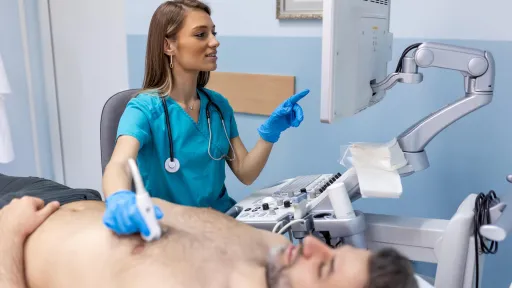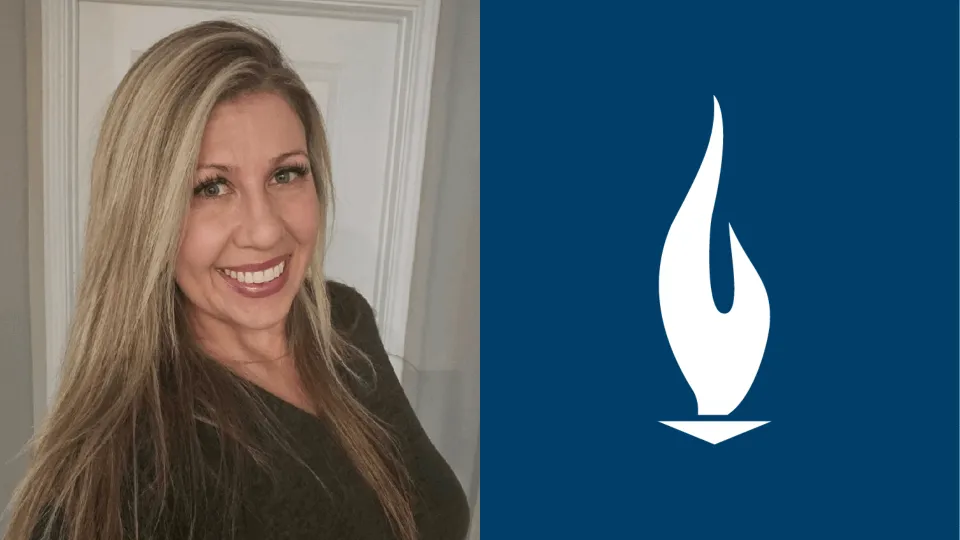
Cardiac sonographers use ultrasound imaging technology to capture pictures of patients' hearts and blood vessels. In this article, we outline the educational path, certifications, and necessary skills to enter this exciting health care field. We also explore the long-term prospects and advancement opportunities for cardiac sonographers.
What is Cardiovascular Sonography?
Cardiovascular sonography is an area of health care that focuses on viewing and capturing internal images of the cardiovascular system. Professionals in this field use specialized ultrasound equipment to create high-resolution images of the heart and blood vessels, including:
- Echocardiograms to examine the heart's structure and function
- Doppler ultrasounds to evaluate blood flow through the heart and vessels
These noninvasive diagnostic tests can help determine the health of patients. Cardiovascular sonographers liaise with physicians who diagnose, treat, and monitor cardiovascular conditions, including heart disease, blood clots, and congenital issues.
Cardiovascular sonography is a field that the U.S. Bureau of Labor Statistics predicts is likely to grow by 3% between 2024 and 2034, as fast as the national average.
Explore: What is the difference between cardiovascular sonography and diagnostic medical sonography
Educational Requirements

Classes in anatomy, math, physics, and physiology are typically necessary to prepare for studying sonography. Cardiovascular sonography programs usually offer advanced lessons in anatomy, applied sciences, and medical terminology.
Concorde Career College offers the Cardiovascular Sonography Associate Degree program at select campuses for candidates pursuing this career. Studying for an associate degree usually takes two years, though the program at Concorde may be completed in as few as 20 months. People with prior health care training may qualify for a one-year certificate program.
Explore: 6 New and Emerging Trends in Cardiac Sonography and Diagnostic Imaging
Clinical Training
Clinical rotations are an important element of cardiovascular sonography programs because they give students hands-on experience caring for patients and using ultrasound equipment. Students receive clinical training in health care settings such as hospitals and imaging laboratories. This training may also be a cardiovascular ultrasound certification requirement.
During clinical training, students refine their techniques by scanning patients under the supervision of their instructors. They learn to position and communicate with patients and operate equipment to acquire definitive cardiovascular images. Clinical training also teaches students to work confidently as part of a health care team.
Related: Cardiac Sonography: A Comprehensive Guide
Certification and Licensure

Professional certification demonstrates that a cardiovascular sonographer has sufficient knowledge and experience. Though certification is voluntary, obtaining it may increase employment opportunities. Employers may require candidates to hold certification or commit to obtaining it within 12 to 24 months of employment.
Cardiovascular sonographers must meet the certifying bodies' eligibility requirements, which typically include passing a CAAHEP-accredited program and gaining relevant clinical experience. Eligible candidates can earn certification by passing a credentialing examination. Those who pass the examination become registered health care professionals. Certifying bodies for cardiovascular sonographers include Cardiovascular Credentialing International and the American Registry of Diagnostic Medical Sonographers.
The ARDMS issues the following relevant certifications:
- Registered Diagnostic Medical Sonographer
- Registered Diagnostic Cardiac Sonographer
- Registered Vascular Technologist
CCI issues the following relevant certifications:
- Registered Cardiovascular Invasive Specialist
- Registered Cardiac Sonographer
- Registered Congenital Cardiac Sonographer
- Registered Vascular Specialist
- Certified Cardiographic Technician
- Advanced Cardiac Sonographer
Both organizations require registered health care specialists to pay renewal fees and participate in ongoing cardiovascular sonographer education to maintain their certification.
At the time of writing, the only states with approved legislation requiring the licensure of sonographers are:
- New Hampshire
- New Mexico
- North Dakota
- Oregon
Explore: Echocardiographers: Cardiac Imaging Experts
Skills and Qualities
Cardiovascular sonographers use technical and interpersonal abilities to succeed in their roles. Some of the skills and qualities that employers look for in cardiovascular sonographer candidates include:
- Technical proficiency: Cardiovascular sonographers operate and maintain specialist ultrasound equipment, such as echocardiograms and Doppler ultrasounds.
- Computer literacy: These health care professionals understand software such as image processing and analysis programs and electronic health records.
- Attention to detail: Sonographers follow physicians' instructions to obtain relevant, high-quality images and provide accurate analysis.
- Physical stamina: These technicians usually stand for long periods and lift or turn patients with mobility issues when necessary.
- Hand-eye coordination: Sonographers accurately move ultrasound equipment to get the most informative medical images.
- Clear verbal communication: They use accessible language to explain complex procedures to patients when preparing them for scans and discuss their findings with members of health care teams.
- Comprehension: Ultrasound professionals often take comprehensive medical histories and answer questions when preparing patients for scans.
- Empathy and compassion: Sonographers understand when patients are nervous, uncomfortable, or in pain and help them feel at ease during scans.
- Critical thinking: Cardiovascular sonographers can customize examinations to accurately assess images and recognize areas of concern.
Career Outlook and Advancement

With opportunities projected to increase by 3% between 2024 and 2034, the career outlook for cardiovascular ultrasound professionals is bright. Factors that may fuel this growth include:
- An aging population that increasingly needs testing to diagnose and monitor conditions, including blood clots
- The risk factors and prevalence of cardiovascular diseases, which are predicted to rise over the next 30 years and increase the need for testing
- The need to replace cardiovascular sonographers who move to different roles or leave the workforce, such as retiring health professionals
Demand for cardiovascular sonographers is likely to increase across work settings. According to the U.S. Bureau of Labor Statistics, in 2024, approximately 64,700 cardiovascular technologists and technicians worked in the United States.
- 75% were employed by state, local, or private hospitals
- 13% were employed in physicians' offices
- 4% were self-employed
- 2% were employed by outpatient care centers
- 2% were employed by medical and diagnostic laboratories
Cardiovascular sonographers who want to advance in their career can choose to specialize in areas of interest, such as:
- Pediatric echocardiography: performing scans on children under the age of 18
- Fetal echocardiography: performing scans on fetuses
- Adult echocardiography: performing scans on patients over 18
After gaining experience, cardiovascular sonographers can advance to supervisory or management roles, such as lead sonographer or technical director. Additional training in relevant topics, such as health administration or organizational leadership, may help people aspiring to these advanced roles secure higher positions.
Cardiovascular sonographers may also move into education or sales. Additional studies may help them make career changes. Roles cardiovascular sonographers might consider include:
- Sonography educator: teaching students about sonography
- Research sonographer: conducting imaging tests and performing administrative tasks for clinical research projects
- Applications specialist: teaching sonographers and health care providers about ultrasound equipment
- Ultrasound system sales: selling ultrasound equipment to health care facilities
Cardiovascular sonographers might also consider resuming their studies to pursue other health care roles, such as nurse practitioner or massage therapist.
Is cardiovascular sonography a good career? If you want to work with physicians and help patients with their cardiovascular health, pursuing a career as a cardiovascular sonographer may be a good fit. Pursuing cardiovascular sonographer certification requires dedication and hard work but can lead to a rewarding career in health care. Consider researching cardiovascular sonography programs and speak with practicing professionals to learn more about this exciting field.
Home. (2025, April 18). Bureau of Labor Statistics. https://www.bls.gov/ooh/healthcare/cardiovascular-technologists-and-technicians.htm
ARDMS Credentials | Ultrasound Exams & Prerequisites. (2018). ARDMS. https://www.ardms.org/get-certified/
Get credentialed - CCI - Cardiovascular Credentialing International. (2023, August 2). CCI - Cardiovascular Credentialing International. https://cci-online.org/credentials/get-credentialed/
Maintain your ARDMS Credentials. (n.d.). ARDMS. https://www.ardms.org/maintain-certification/
Renew Credentials - CCI - Cardiovascular Credentialing. (n.d.). CCI - Cardiovascular Credentialing International. https://cci-online.org/renew-credentials/
State Licensure. (n.d.). Www.sdms.org. https://www.sdms.org/advocacy/state-licensure
Joynt, K. E., Mitchell S.V. Elkind, Aparicio, H. J., Commodore-Mensah, Y., Sarah, Dowd, W. N., Hernandez, A. F., Khavjou, O., Michos, E. D., Palaniappan, L., Penko, J., Remy Poudel, Roger, V. L., & Kazi, D. S. (2024). Forecasting the Burden of Cardiovascular Disease and Stroke in the United States Through 2050—Prevalence of Risk Factors and Disease: A Presidential Advisory From the American Heart Association. Circulation, 150(4). https://doi.org/10.1161/cir.0000000000001256
Cardiovascular Technologists and Technicians. (2025, August 28). Bureau of Labor Statistics. https://www.bls.gov/ooh/healthcare/cardiovascular-technologists-and-technicians.htm#tab-3
Take The Next Step Towards a Brighter Future
Interested in learning more about our Cardiovascular Sonography program?
We have a Concorde representative ready to talk about what matters most to you. Get answers about start dates, curriculum, financial aid, scholarships and more!







